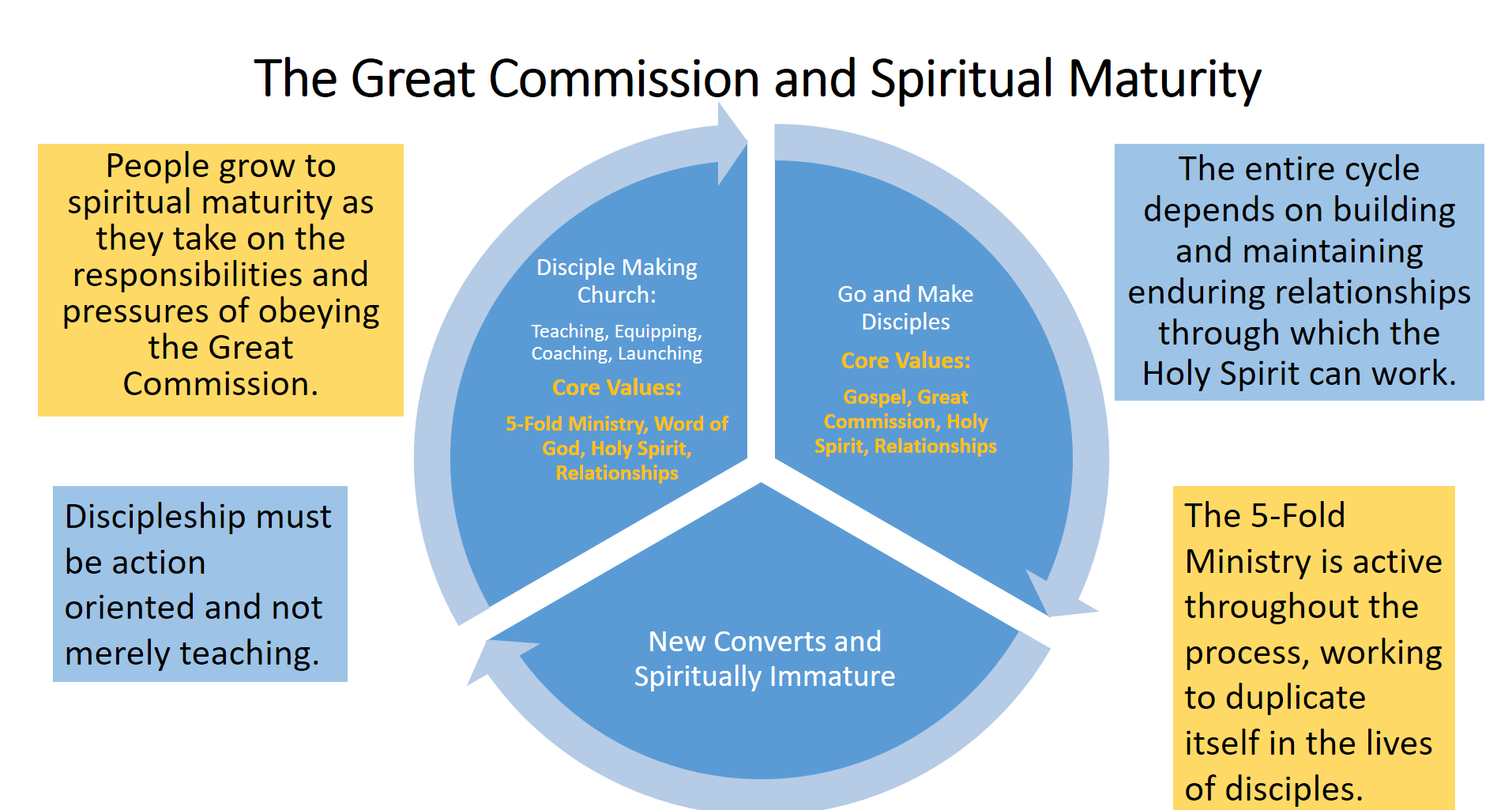Genesis and Church Priorities
 In this article I will try to show that Genesis gives humankind three main priorities or life purposes: multiplication, dominion, and tending. Some church leaders believe that bringing the church to maturity is the top priority for the church. I believe this priority is really secondary and falls under the taking dominion and tending commands. My thesis is that making the Great Commission (multiplication) our top church priority will actually serve to bring the church to spiritual maturity. However, if we make achieving spiritual maturity our goal, we often fail to pursue the Great Commission with the vigor it deserves.
In this article I will try to show that Genesis gives humankind three main priorities or life purposes: multiplication, dominion, and tending. Some church leaders believe that bringing the church to maturity is the top priority for the church. I believe this priority is really secondary and falls under the taking dominion and tending commands. My thesis is that making the Great Commission (multiplication) our top church priority will actually serve to bring the church to spiritual maturity. However, if we make achieving spiritual maturity our goal, we often fail to pursue the Great Commission with the vigor it deserves.
Both the missional and maturity perspectives can point to important scriptures to bolster their positions. The missional view typically uses Matthew 28:18-20 for its foundation, and the maturity perspective uses Ephesians 4:11-16. I agree that both are vital aspects of the Holy Spirit’s work in the church. Romans 8:29 states that all things are working towards conforming us to Christ’s glorious image. God wants to make us into “little Christs” or Christians who represent and glorify him as wonderfully as possible. In addition, Christ commissioned his followers to go into all the world to make disciples. The end product of what the Spirit is doing in individuals is conforming us to Christ’s image. The work of the church, however, is the Great Commission.
I readily admit that maturing God’s people into Christ’s image is a major aspect of what the Holy Spirit is doing, but I argue that maturity is more of a by-product of pursuing God’s mission instead of being the direct goal.
Genesis and God’s Purpose for Humankind
The first few chapters of Genesis answer the five most important life or worldview questions.
- Origin: From where did I come?
- Identity: Who am I?
- Purpose: What is my purpose in life?
- Morality: How do I know what is right and wrong?
- Destiny: What will happen to me after I die?
The purpose question is answered in the following verses.
And God blessed them. And God said to them, “Be fruitful and multiply and fill the earth and subdue it, and have dominion over the fish of the sea and over the birds of the heavens and over every living thing that moves on the earth.” Genesis 1:28 (ESV)
Then the LORD God took the man and put him into the Garden of Eden to cultivate it and keep it. Genesis 2:15 (NASB)
The basic purpose of humankind can be summarized in three points: multiply, take dominion, and tend the garden. These commands were specific to Adam’s and Eve’s situation, but a case can be made that they are still in effect, since there is no record anywhere that God rescinded them. The “garden” should now be understood as the entire earth in which we live, tainted as it is by sin. While these purposes apply to every human being in a practical and natural way, I also believe that they apply directly to the mission of the church.
Fruitfulness and Multiplication
It is important to note that the top priority, based on the order in which these commands were given, is to be fruitful and multiply. This command we restated after the flood. The earth then and now needs to be populated. The Great Commission was another restatement of this foundational command after the resurrection. “Go and make disciples” is another way of saying, “Be fruitful and multiply.” The earth now desperately needs to be populated with born again believers who seek first God’s kingdom and righteousness.
The world system argues effectively that we should not obey God’s command to be fruitful and multiply. The reasons given are many.
- There are already too many people. If we don’t cut back on births, the earth will be over populated, which will usher in many calamities, such as starvation.
- Children are too expensive. We cannot afford to have kids.
- The world is too evil to bring children into it. Compassion for the not yet born prohibits our having children.
- Children are too much trouble. They keep us from pursuing our priorities in life.
As a result, Western nations have embraced abortion, birth control, fear, unbelief, and a self-centered lifestyle in direct defiance of God’s command to be fruitful and multiply. Many nations in the West now teeter on the brink of cultural viability because of low birth rates. The world will go to those groups which are still having large numbers of children.
Since we live in the culture that has embraced this anti-God mentality, we are affected by it. Unwittingly, churches have adopted variations of these arguments, although without knowing it. Our policies and mindsets are dictated by the following beliefs.
- When we have a “large enough” church which can provide the desire for fellowship, financial viability, social status, and programs, we sometimes lose the desire to sacrifice in order to “go” and make disciples. We would rather stay and enjoy the fellowship.
- We invest most of our finances in maintaining the building, programs, and operational costs of maintaining the church plant, instead of spending time, energy, and money on pursuing the Great Commission.
- The world is evil and unsafe. Rather than put our people at risk by asking them to immerse themselves in lifestyle evangelism and connecting with broken, unsaved people, we prefer the safety of the Christian fortress called the church. We devise so many programs for our members that they are worn out and have little or no time for pursuing the Great Commission, even if they were willing to take the risks of associating with unsafe people.
- Missional living is too much trouble. It is far easier to contribute money or volunteer to serve in crisis intervention programs than to get involved in the lives of people who have untold needs and will make unanticipated demands on my time and finances.
By failing to prioritize the Great Commission, churches and individual followers of Christ put other things first. Busyness with church meetings and other responsibilities rob people of the time, energy, and creativity that could be invested in reaching friends, neighbors, co-workers, and family with the Gospel and discipling them. Taking the church outside the four walls of our buildings sounds great, until you actually start making the changes necessary to make it happen. The reality is that we prioritize what goes on inside the four walls.
Building the local church sometimes has taken the place of building the kingdom. Having great meetings has become more important than spending time with the unsaved and unchurched. Only by reprioritizing the Great Commission will the church become the missional force God intends it to be and grow to spiritual maturity. Self-centered people never mature.
Taking Dominion and Tending the Garden
Taking dominion and tending the garden are important secondary commands. If the multiplied people on the earth and in our churches are to enjoy a good quality of life, they will have to control and tend their environment. In the process of being fruitful, taking dominion, and working in the garden, people grew to maturity. That is how it works.
Young men and women often enter marriage with little maturity. Our culture fosters this condition by demanding little from young people during their teen years and early twenties. Usually it is only after marrying and having children that they truly “grow up” because of the added pressures and responsibilities. Why would we think it would be any different in the church?
In the world, taking dominion is a many-faceted enterprise, ranging from controlling predators and pests to mining to farming. Humans have done well in some areas and raped the earth in others. Taking dominion alway needs to be balanced by the command to tend the garden or the world.
In the spiritual context, taking dominion involves learning to identify with Christ’s victory and the internal work of the Holy Spirit in a way that allows us to be victorious over our sin nature, sin, Satan, sickness, legalism, death, and the demonic. Basically anything that seeks to enslave or destroy God’s people must be brought into subjection to Christ through our faith, testimony, and willingness to give up our lives for the Lord.
And they have conquered him by the blood of the Lamb and by the word of their testimony, for they loved not their lives even unto death. Revelation 12:11 (ESV)
Unless we learn to take dominion, we will not be able to properly tend and protect (keep) the garden, the church.
Tending the garden means caring for the sheep. This includes protecting, feeding, guiding, equipping, and launching them into ministry – discipleship.
The Great Commission, the Church’s Top Priority
We cannot simply tell young men to “grow up” and expect that to happen unless we put them into situations that make them mature. Boot camps place men and women under extreme pressures to produce mature soldiers. Whenever people take on greater responsibility, it will foster growing to maturity. In the church, if we make our focus growing to maturity without expecting people to obey Christ’s command to multiply through evangelism and disciple making, we will likely be disappointed.
Instead of accepting the Great Commission as priority one, we have substituted other things: Bible study, moral development, leadership training, and serving church programs. When we do this, we produce caricatures of true disciples.
- Devotees to Bible education and theological training may end up being a modern version of the Pharisees, who esteemed themselves to be guardians of the truth while at the same time rejecting the Messiah and his mission.
- Putting moral development at the top of the list is likely to produce legalists who self-righteously demand adherence to their standards of behavior to the point of being critical and exclusive toward those who do not measure up.
- Leadership training, while being a good thing in general, can easily develop men and women who buy into the world’s concepts and methods for running the church like a business and treating people as cogs in the church machine.
- Serving church programs makes the church inwardly focused and saps the energy and time that could otherwise be given to pursuing the Great Commission’s first point: “Go.”
In the West, we long ago adopted the Greek system of education, which demands vast investments of time in lectures, studying books, and testing in order to prepare and equip people to enter into responsible positions in society and the church. Jesus used a much different approach, which was more “hands on” and action-oriented. He taught and then immediately required his students to use what they had been taught. Putting what we learn into practice is the best way to increase understanding and retention. Often we think we know something until we have to use it or teach it. Then we find out what we do and don’t know or understand. What we must understand is that discipleship is action and ministry oriented. Discipleship is best done in a “hands on” manner, in which the mentor teaches, demonstrates, oversees, and, finally, launches. Our disciples will learn far more after they have been launched than they did in the secure environment of having the mentor readily at hand.
Young parents learn how to parent by doing it. They become much more open to advice when they see the need for it. What may have seemed boring and academic suddenly has a real life application! Likewise, when we help people to get out of the safe confines of the local church and into their communities in obedience to the Great Commission, we place them into an environment in which they must sink or swim. Immediately they will find out what they do and do not know. Hopefully they will thirst to grow in the knowledge of the scriptures and in their ability to minister to others through the power of the Holy Spirit. Pursuing the Great Commission will excite their desire to grow to maturity in the Lord. Staying in the local church context allows people to stagnate.
Have you ever noticed that young couples without children are often experts on how to raise and discipline children. They are sometimes critical of how parents are doing their job. But once they have kids of their own, they find out how difficult and challenging parenting is. We must beware of creating theological monsters whose only understanding comes from a theoretical classroom context, instead of a “boots on the ground” experience.
Pursuing the Great Commission as our top priority will help ground our people in real life applications of God’s Word and preserve us from spiritual pride. It’s difficult to be proud when we are helping people wrestle with real life problems which often confound even the wisest in our midst.
Conclusion
Making bringing people to spiritual maturity our top priority can end up frustrating God’s purposes. Far too many capable and promising followers of Christ have been deceived into thinking that God’s highest purpose for their lives is growing in biblical knowledge and serving in the local church.
When we make the Great Commission our top priority, everything else falls into place. We force people to grow in the knowledge of the Word in ways that help them connect with people, share the Gospel effectively, minister in the power of the Spirit, and teach them to do likewise. This is the essence of what it means to make disciples.
When young married couples have children, they learn to give their lives away for others. Having children, natural or spiritual (disciples) changes our lives in a most fundamental and rewarding way. In old age, there is no greater joy than being with our offspring, especially if they are in unity and serving the Lord, and seeing what they are doing in life and ministry. Late in Paul’s life, he rejoiced in his own spiritual children, when he wrote:
Therefore, my brothers, you whom I love and long for, my joy and crown, that is how you should stand firm in the Lord, dear friends! Philippians 4:1 (NIV)
We do not rejoice when our children never leave the home: rather, we prepare them to leave the “nest” to start their own families. This is how we fulfill the command to be fruitful and multiply. The church likewise must think in terms of launching people to start their own church families, which will also reproduce. This can be done at a small group level or entire church level.
Let’s make the Great Commission our top priority so that we, like Paul, can rejoice in our spiritual children and grandchildren (disciples of disciples)! Let’s make God’s first priority from creation onward our first priority and watch how everything else falls into place.
But seek first the kingdom of God and his righteousness, and all these things will be added to you. Matthew 6:33 (ESV)








